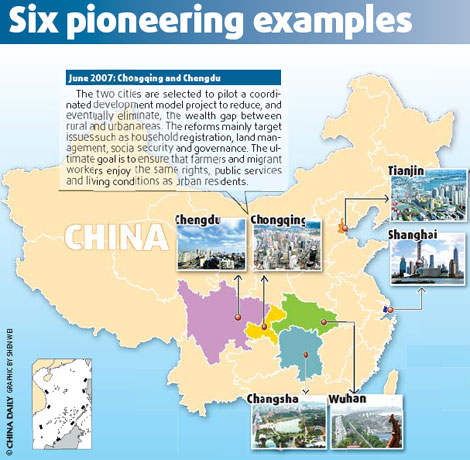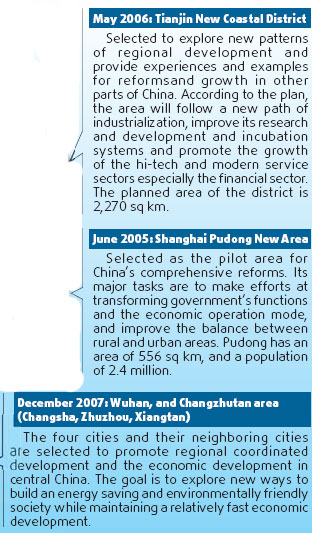

|
Local people carry rubbish away from the Xiangjiang River to keep the water clean. |
Local legend goes that a beautiful goddess protects the Xiangjiang River, the largest river flowing through central China's Hunan province. People living in the region worshipped her for bringing abundant grains and, according to the writings of a melancholy poet over 2,000 years ago, were enchanted by her beauty.
Yet when people live for profits, money is king and beauty has to fade. As Hunan locals join China's economic boom and try to make a quick buck, busy factories with noisy generators have spewed pollutants into the goddess river. The factories may enrich the residents, but doesn't necessarily make life better. The river, once famous for being clean and clear in ancient writings, has gone black in some parts and even sickened people living nearby.
According to statistics from the local environmental protection administration, over half of the 70-km-long river has been polluted. And the sulfur dioxide discharged along the river makes up 68 percent of the overall polluted air in the entire province. This makes the river a major pollution spot and a potential source of pollution on an even larger scale.
Fortunately, a major project to restore its purity is going on in the province. The initial aim is "to make the water drinkable", as a local environment official says. The province plans to spend 17.4 billion yuan within three years to clean the river. More than that, the project is seen as a landmark job for an even larger project that reflects a shifting focus as China reviews its three decades of reform and opening up.
For the past thirty years, China's fast development has been mainly driven by the quick, breathtaking industrialization of southern coastal cities. These measures worked as the country's economy grew at a double-digit rate for decades, but it came at a high cost to the environment. But as the country tries to draw lessons and experiences from the past, China's central region, which lags behind the development, is thinking of new, clean models.
People living there still want a rapid economic development, but most won't now sacrifice the environment for it. As Party secretary of the province, Zhang Chunxian, says: "If our industrialization leads to smelly water and dirty air, and an increase in illness, our offspring are going to curse us. "
This is in accordance with the general plan of the country. After designating several cities as "special zones" and focusing on an export driven economy in 1980s, China has laid plans to push for high speed economic development while keeping the environment clean. Therefore, the State Council last year approved the development plan of two provinces, Hubei and Hunan, both located in central China, to build an energy saving and environmentally friendly society, known in short as a "two type society".
In a letter to the provincial government, the National Development and Reform Commission asks the local authority "to develop a mechanism that is good for energy saving and environmental protection as soon as possible, and to take a new way that is different from the traditional model of urbanization and industrialization".
As the starting point of the ambitious plan, provincial governor Zhou Qiang says treatment of the Xiangjiang River is going to be a landmark project.
"We are going to build the Xiangjiang into the Rhine of China, and the focus of the work now is to treat the pollution of the river," says Zhou.
But the treatment of the river requires money and the closure of factories, which could be more expensive. Over 70 percent of pollutants in the river are from the chemical, non-ferrous metal, and iron industries. And they are a major force in the area's economy. For instance, chemical and non-ferrous industries take up over half of the overall GDP in Zhuzhou and 63 percent in Xiangtan, two major cities along the river.
Another problem in the treatment of the river is that no city stands alone in the project. Among the major cities along the river, Changsha is a center for service industry and equipment manufacturing, while Zhuzhou and Xiangtan are centers of the heavy chemical industry.
Each of these cities could either contribute to cleaning up or damage the whole river. For instance, Xiangtan, the hometown of late Chairman Mao Zedong is located at the high end of the river, and pollution from this city could still make all the efforts by the rest futile.
"This area has to face the most typical challenge faced by the industrialization of China. Different cities need to deal with the pollution of a river together. Meanwhile, they have to upgrade their industry while dealing with the pollution," says Zhu Xiang, an urban planning expert based in the province.
But before, driven by GDP growth, each city worked separately. A city might be talking about environmental protection and forbidding the entry of damaging industries while the other one was trying to attract as much foreign investment as possible, with no thought to the environmental consequences. Under that situation, no one is going to take the responsibility for the pollution. Huang Changjian, a former environment protection official, suggests that the three cities need to establish an environmental protection team and work together.
Also, under the overall green framework, a team led by the head of the province has been established. Provincial governor Zhou says the province will build 113 sewage water treatment factories along the river and either treat or close the high polluting enterprises along the river.
The provincial government also requires each level of the government to make the anti-pollution drive a priority when trying to attract foreign investment.
Some measures are already in place. According to governor Zhou, this year the provincial government has closed about 40 factories along the river. And each city along the river is making their own plans for water treatment. For instance, Xiangtan plans to close all the paper mills with an annual output of under 10,000 tons and shut down similar ceramic enterprises, generator makers, and glass makers along the river within three years.
The government is going to supervise the process, but the market will also play an important role. Jiang Yimin, director of the environmental protection administration of Hunan province, says: "It is not only the job of the government, we do let the market to play a major role as well."
Jiang adds that according to the plan of the provincial government, they also plan to make use of the market's "invisible hand" and let enterprises follow.
"Whoever polluted the river needs to treat it, and whoever discharged sewage water needs to pay for it," says Jiang.
In addition, those who contribute to the treatment of the river need to make a profit from it. In this way, the effort of cleaning the environment can also become an industry. And Jiang adds that importing the market mechanism is the key issue that he is thinking about now.


(China Daily 10/20/2008 page10)













